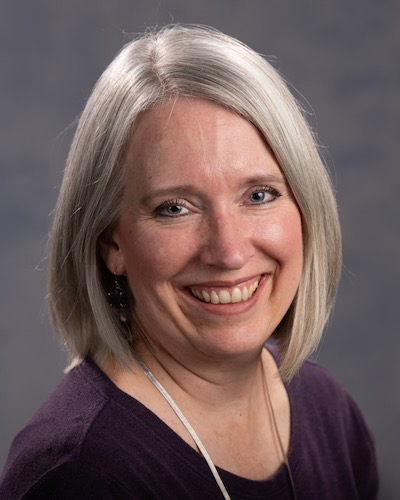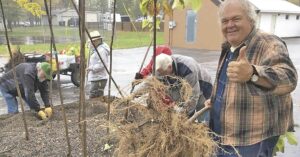Eliza Tanner Hawkins doesn’t love dealing with paper. So when she saw the need for Braver Angels to digitize the written evaluations of its events, she acted on it.
Eliza got involved with Braver Angels in 2019, training as a moderator and volunteering in that capacity until COVID-19 shut down in-person events. Soon after, she created the first digital versions of the feedback forms with customer experience management software she used in her work. “I thought there must be a better way to collect the feedback we need,” she explains.
Her initiative got the attention of Paul Kuhne, then Braver Angels’ Evaluation and Data Analytics Coordinator, and he invited her to join the Evaluation Steering Committee.
She was joining an unseen but essential cog in the BA machinery. For almost three years, Paul and the Evaluation team brought order to the data turmoil typical of any fast-growing organization. They supported best practices in data management and aggregation across the BA network. They helped the leadership team to prioritize what BA should be researching and what data sets it should be evaluating and why. Paul and the team also coordinated the screening of outside groups’ requests for BA’s program data. “We’re the clearing house for any academic group that wants to do analysis on Braver Angels” is how he put it.
In his time with Braver Angels, Paul led the aggregation, cleaning, and visualization of the data from more than 2,000 self-reported program evaluations, most of which had been on paper. He drafted a detailed 2019 report outlining the background literature, Braver Angels’ theory of change, and the organization’s quantitative stated impact (check it out at https://is.gd/uvk2zH). Paul also developed summary slide decks for presenting to foundations and for the BA leadership team to use in their work.
Last month, Eliza took over as the team’s coordinator when Paul transitioned out of that role to consult to another non-profit. Eliza, an adjunct professor of communications at Brigham Young University (BYU) in Utah, has also joined Braver Angels’ Scholars Council, as has her husband, a BYU professor of political science.
Separately, and with the blessing of BA leader Bill Doherty, Eliza has adapted some of the organization’s Skills for Bridging the Divide techniques to form the kernel of a one-week module in her Ethics class, with very promising if anecdotal results. The plan, in concert with BA’s Evaluation Committee, is to extend this learning to larger groups of students across three universities in Utah.
Right now, Eliza and the Evaluation Team are focused on three priorities. The most immediate is to publish the latest BA Report (Depolarizing During the Pandemic). This 2020-2021 report to members and external stakeholders showing evidence of and data about the organization’s overall impact will be available by mid-January. This report will be quickly followed by the 2021 BA Year in Review report, sharing the results of participant feedback from the 2021 calendar year.
The second task is to gain widespread recognition as the go-to center for evaluation of new and evolving programs. “We love to work with all the programs and want to ensure they are using appropriate Braver Angels feedback forms,” says Eliza. And the third priority is to set up a better system for using pre- and post-event surveys to measure and thus improve the impact of, say, Red/Blue workshops. “So we can make some stronger statements about the effectiveness of Braver Angels’ work,” she explains. That feedback is especially valuable for the field operations team since its members are on the front lines of event development and management nationwide.
In case this all sounds a bit Big Brother-ish – especially for a grass-roots, volunteer-run organization – it isn’t. The fact is, Braver Angels is growing so fast that it’s constantly in danger of outrunning the data it needs to keep operating. Yet while it’s crucially important for any growing organization to develop consistent processes and systems, there’s still plenty of room for alliance members and others to experiment with new event formats and themes.
So what would success look by Jan 2023 for Eliza and her colleagues? Implementation of pre-and post-event surveys is high on the list, as is designing the best fit between the Scholars Council (the new Braver Angels group that has real potential to elevate and deepen the organization’s research on depolarization) and the Evaluation team. She and her team also are eyeing development of a longitudinal survey – a scientifically conducted study, over at least 12 months, of how BA programs are reducing peoples’ levels of polarization.
So let’s hear it for the Evaluation team. Their work is not as visible as a Braver Angels workshop or town-hall event, but it is every bit as valuable. Thanks, Eliza and team!




